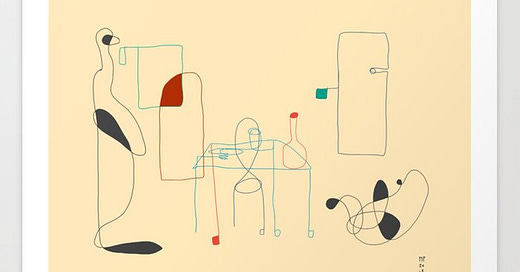Why It's So Hard To Pay Attention To Things That Matter
And what an attention deficit really means.
“Attention is the beginning of devotion.”
What does it mean when we give our time and attention to things that don't matter, waste our time, or dull our minds?
In essence, attention is a form of love. To give someone or something our unalloyed attention is the purest expression of devotion and care.
You'd think we'd ration this scarce resource, maybe save our most attentive selves for the people we love or for the intentions that benefit our wellbeing most. But we don't. We spend our attention, our love, like play money investing in silly things, silly people, silly arguments.
Or at least I do that too much of the time. (I won’t speak for all of you fine people.)
Online hours slip away like eggs off a frying pan. Finishing even a good book feels like a challenge. I save in-depth reading for when I'm really rested. It's easier to curl up with a juicy TV show too often. I'd be ashamed to see a chart comparing how many minutes I've spent comfort scrolling short goofy videos versus having meaningful conversations with my kids or relearning to draw, as I promised myself earlier this year.
I know it's not just me, and this can't possibly be just a matter of willpower and lifehacking yourself into efficiency. There are just too many of us with the same lament And it’s not all about work productivity. This chaotic fragmented feeling seems more like a symptom of a more significant, scarier unease like we're losing agency over our own priorities, and even our own minds.
I heard answers to some of these questions in a recent interview with British journalist Johann Hari, author of Stolen Focus: Why You Can't Pay Attention--and How to Think Deeply Again. He makes the case that there is a collective deterioration of our ability to focus.
It's systemic. The average attention span is dwindling fast. Office workers can't focus for more than three minutes at a time these days, and we've gone from watching YouTube videos which were 10 minutes on average, to 15-second TikTok videos.
We live in a digital environment that is finely calibrated to attract, harvest, and resell our attention. To gain our attention is to have the power of persuasion whether it’s convincing us to buy something or support someone’s cause. Every company and cause is fighting for minutes or seconds of our time using a potent arsenal of technology and psychology to distract us from our own intentions. These seductive and intrusive bids for our attention interrupt our day, our thoughts, our choices.
And because our ability to focus is finite, we’re left with less energy, less authentic attention, and yes, less love left to give to the people and things that matter to us. Hari calls this theft and has said that a business model based on "discovering the weaknesses in your attention in order to hack it and sell it to the highest bidder is fundamentally immoral."
It's no accident that we describe attention with the same terms we use to talk about money. We live in an "attention economy," and we "pay attention," literally. We hand over attention and with it our behavioral data in exchange for services like social media, email, or entertainment.
So, of course, we're always running "attention deficits" as corporations rack up more of their favorite metric, "time spent" with their product, cause, or program.
Netflix’s CEO Reed Hastings said in 2017 that their biggest competitor is their customers’ need for rest:
“We actually compete with sleep,” said Hastings. “And we’re winning.”
Netflix and other streaming services use sophisticated behavioral science and persuasive design to keep us watching, yet we still beat ourselves up for not having enough willpower to resist.
Tech expert and former Google employee James Williams argues that this is an example of "existential distraction" governed by platforms that undermine our personal goals, shape our behavior, and erode our free will.
We're especially vulnerable to that kind of manipulation because we are more tired than ever. We sleep about 20% less than we did 100 years ago. And Hari points out that just that lack of sleep would be enough to trigger an attention crisis. Tired minds crave hyper-stimulating amusements. And it’s easy to sink into the sugary quick-hit content that’s pushed in front of us over and over again.
If attention is love, then the more time and attention we devote to these digital distractions, the more we fall in love with them or at least learn to crave them. It reminds me of that famous experiment where they invited two people who didn't know each other to stare deeply into each other's eyes for four minutes. Researchers found that even this contrived attention sparked feelings of care and love in the couples that did it.
Williams advocates for a "freedom of attention" movement in which we are the customer, not the product, and technology helps us pursue our own goals no strings attached. Hari's book also has ideas on how we can regain our focus. (He writes about how he unplugged from the internet for months, and yes, his focus returned, as did his ability to choose better what to pay attention to, but admits it's not sustainable.)
Who knows if the companies that control most of our digital attention will change their supremely profitable business model. But one focus-retaining tactic that might be within our power is try like hell to get more sleep to improve our resilience, and stamina. (Tips below.)
And maybe I’ll make that attention spreadsheet— a list of who and what I gave my attention to in a week. See where I net out on distractions v. real connections.
It's time to stop giving our love away in all the wrong places.
Resources:
A Vox interview with Johann Hari about his book, Stolen Focus: Why You Can't Pay Attention--and How to Think Deeply Again.
Watch: Distraction by Design: Why the Attention Economy Is In a Moral Crisis with James Williams
Arianna Huffington’s excellent guide to more and better sleep.
p.s. How does distraction affect your life?
It’s Not Just You is a free weekly essay, uplifting recommendations, and a community of thousands. If you love it, consider supporting my work with a paid subscription. You’ll gain access to “Dear You,” a monthly advice column and special podcast editions.
RESILIENCE DELIGHTS
•Watch this happy montage from The Guardian to see artist Allie Olson do her radiation runway dance. It’s a lesson in how joy and resilience intersect. She’s now cancer-free, and you can follow here: @allieolsonart
• It’s Your Friends Who Break Your Heart: The older we get, the more we need our friends—and the harder it is to keep them, writes Jennifer Senior in The Atlantic.
• When It Comes to Good Habits, There Is No Finish Line. Here’s How to Keep Going, by Gretchen Rubin, author, and host of The Happier Podcast.
“We made a pact, in the very beginning, that we would never be treated with disrespect by all the male musicians in the community,” says Stevie Nicks of her friendship with Fleetwood Mac bandmate Christine McVie in this fascinating interview with Tavi Gevinson in The New Yorker.
POETIC DELIGHTS

Perhaps the World Ends Here
The world begins at a kitchen table. No matter what, we must eat to live.
The gifts of earth are brought and prepared, set on the table. So it has been since creation, and it will go on.
We chase chickens or dogs away from it. Babies teethe at the corners. They scrape their knees under it.
It is here that children are given instructions on what it means to be human. We make men at it, we make women.
At this table we gossip, recall enemies and the ghosts of lovers.
Our dreams drink coffee with us as they put their arms around our children. They laugh with us at our poor falling-down selves and as we put ourselves back together once again at the table.
This table has been a house in the rain, an umbrella in the sun.
Wars have begun and ended at this table. It is a place to hide in the shadow of terror. A place to celebrate the terrible victory.
We have given birth on this table, and have prepared our parents for burial here.
At this table we sing with joy, with sorrow. We pray of suffering and remorse. We give thanks.
Perhaps the world will end at the kitchen table, while we are laughing and crying, eating of the last sweet bite.
Find this poem and more of Joy Harjo’s work in The Woman Who Fell From the Sky
How does distraction affect your life?







Great piece Susanna! We were just talking about this at home after recently seeing Johann Hari on Bill Maher. I can relate to almost everything you wrote concerning the distraction of social media. As a musician, my time is best spend with my instrument, not with my smartphone. I probably don't need to tell you which of those is winning most of my attention these days. But I appreciate that I am not alone and what they say about the first step to making changes in yourself is recognizing that you have a problem. That sounds more dramatic than it is... after all it's not a chemical addiction, but important nonetheless. Congratulations on your new adventure, I always look forward to reading your pieces.
I've read that the greatest gift we can give to another person is our time. Your gift to us was your time in writing your post. Thank you